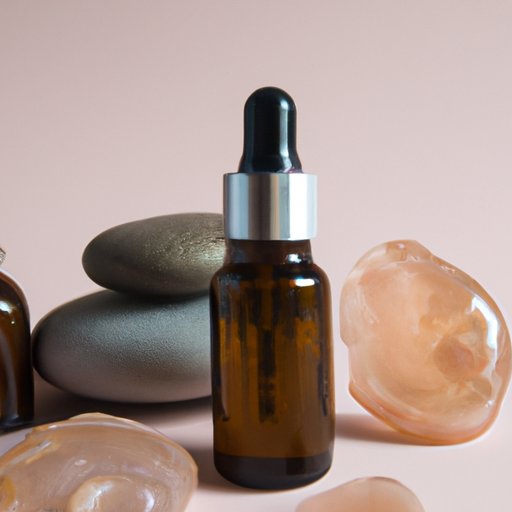Introduction
Mineral oil is a popular ingredient found in many skin care products and cosmetics. It’s derived from petroleum and has a long history of use in beauty and personal care products. But is mineral oil bad for your skin? In this article, we’ll explore the pros and cons of mineral oil for skin care, so you can make an informed decision about whether or not to use it.
Are Cosmetic Products with Mineral Oil Safe?
Before discussing whether mineral oil is bad for your skin, let’s first take a look at the different types of mineral oils used in cosmetics. According to the Environmental Working Group, there are two main types of mineral oil used in skin care products: paraffin oil and petrolatum.
Paraffin oil is a colorless, odorless, lightweight oil that is widely used in face creams, body lotions, and other skin care products. Petrolatum, also known as petroleum jelly, is a thicker form of mineral oil that is often used in lip balms, ointments, and hair products.
So what does science say about mineral oil? According to a study published in the journal Contact Dermatitis, mineral oil is generally considered safe for topical use. The study found that while some people may experience mild skin reactions to mineral oil, most people can safely use it without any adverse effects.
Examining the Potential Side Effects of Mineral Oil on Skin
While mineral oil is generally considered safe for topical use, some people may experience negative side effects when using skin care products with mineral oil. Possible side effects include irritation or allergies.
According to Dr. Joshua Zeichner, director of cosmetic and clinical research at Mount Sinai Hospital in New York City, “Mineral oil may cause allergic contact dermatitis in some individuals who are sensitive to it.” He recommends patch testing products containing mineral oil before using them on your face.
In addition, there is some concern about the long-term effects of using mineral oil-based skin care products. One study published in the journal Food and Chemical Toxicology notes that mineral oil can be absorbed through the skin, and may accumulate in the body over time.
The study found that while the risk of toxicity from mineral oil is low, it’s still important to limit your exposure to it by choosing natural ingredients whenever possible.
Alternatives to Mineral Oil-Based Skin Care Products
If you’re looking for natural alternatives to mineral oil-based skin care products, there are plenty of options available. Natural oils such as jojoba oil, coconut oil, argan oil, and olive oil are all excellent choices for moisturizing and nourishing your skin.
These natural oils contain antioxidants and essential fatty acids that can help protect the skin from environmental damage and reduce the signs of aging. Plus, they’re much less likely to cause irritation or allergies than mineral oil.
Other popular natural ingredients used in skin care products include aloe vera, shea butter, honey, and green tea extract. These ingredients have anti-inflammatory, antioxidant, and moisturizing properties that can help keep your skin healthy and glowing.
Conclusion
At the end of the day, it’s up to you to decide whether or not to use mineral oil-based skin care products. While mineral oil is generally considered safe for topical use, there are potential risks associated with its use, including irritation and allergies. Additionally, there is some concern about the long-term effects of mineral oil use.
Fortunately, there are plenty of natural alternatives to mineral oil-based skin care products. Natural oils such as jojoba oil, coconut oil, argan oil, and olive oil are all excellent choices for moisturizing and nourishing your skin. Other popular natural ingredients used in skin care products include aloe vera, shea butter, honey, and green tea extract.
Ultimately, the decision is yours. Weigh the pros and cons of using mineral oil for skin care, and choose the best option for your skin type and lifestyle. By opting for natural ingredients, you can help ensure that your skin stays healthy and beautiful.
(Note: Is this article not meeting your expectations? Do you have knowledge or insights to share? Unlock new opportunities and expand your reach by joining our authors team. Click Registration to join us and share your expertise with our readers.)
